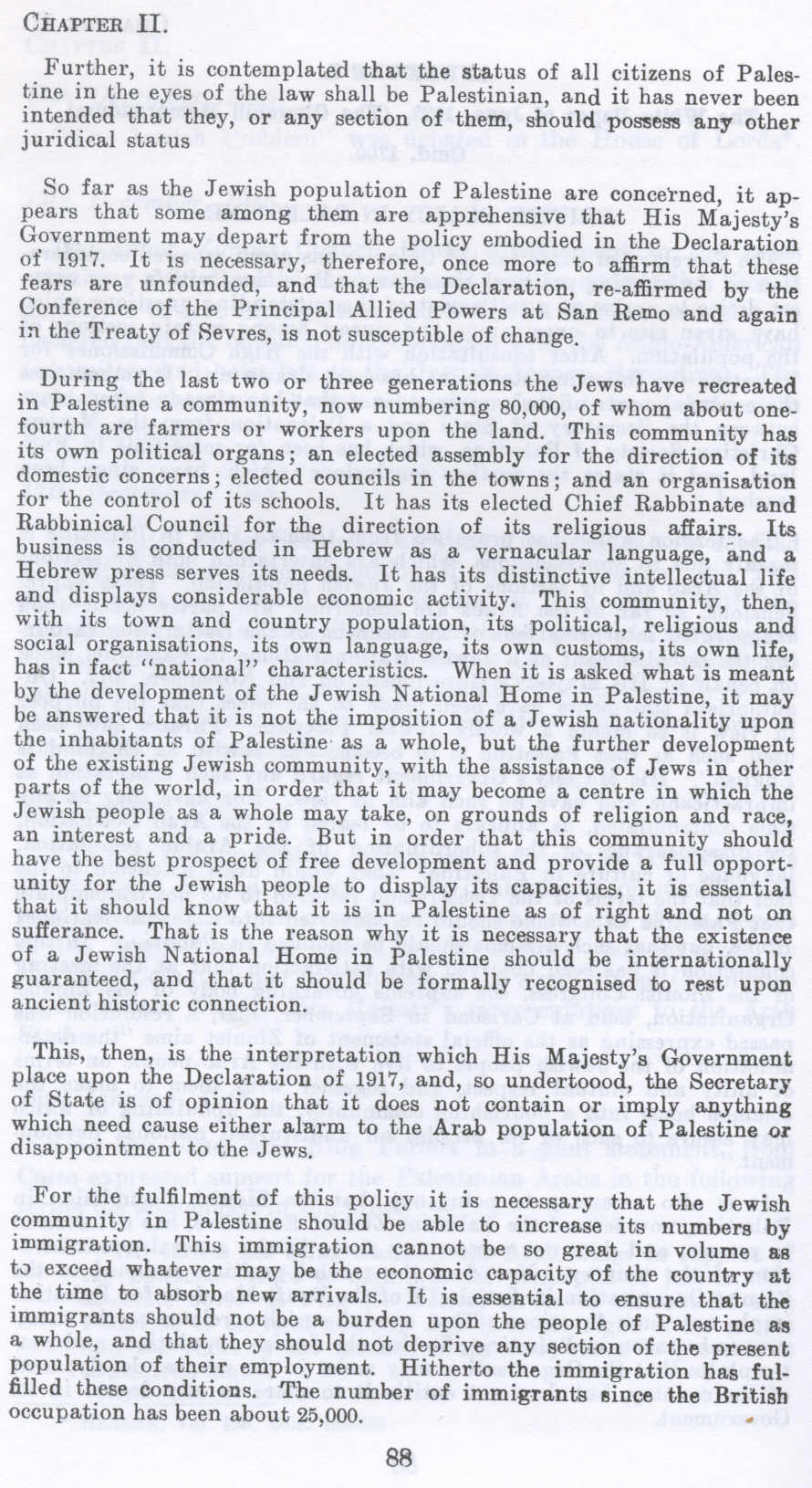| Prev | Next |  |
| Prev | Next |
| PalestineRemembered | About Us | Oral History | العربية | |
| Pictures | Zionist FAQs | Haavara | Maps | |
| Search |
| Camps |
| Districts |
| Acre |
| Baysan |
| Beersheba |
| Bethlehem |
| Gaza |
| Haifa |
| Hebron |
| Jaffa |
| Jericho |
| Jerusalem |
| Jinin |
| Nablus |
| Nazareth |
| Ramallah |
| al-Ramla |
| Safad |
| Tiberias |
| Tulkarm |
| Donate |
| Contact |
| Profile |
| Videos |
British Mandate: A Survey of Palestine: Volume I - Page 88. British Policy in Palestine |
Disclaimer
The above documents, article, interviews, movies, podcasts, or stories reflects solely the research and opinions of its authors. PalestineRemembered.com makes its best effort to validate its contents.


Post Your Comment
*It should be NOTED that your email address won't be shared, and all communications between members will be routed via the website's mail server.
Further, it is contemplated that the status of all citizens of Palestine in the eyes of the law shall be Palestinian, and it has never been intended that they, or any section of them, should possess any other juridical status
So far as the Jewish population of Palestine are concerned, it appears that some among them are apprehensive that His Majesty's Government may depart from the policy embodied in the Declaration of 1917. It is necessary, therefore, once more to affirm that these fears are unfounded, and that the Declaration, re-affirmed by the Conference of the Principal Allied Powers at San Remo and again in the Treaty of Sevres, is not susceptible of change.
During the lest two or three generations the Jews have recreated in Palestine a community, now numbering 80,000, of whom about one fourth are farmers or workers upon the land. This community has its own political organs; an elected assembly for the direction of its domestic concerns; elected councils in the towns; and an organization for the control of its schools. It has its elected Chief Rabbinate and Rabbinical Council for the direction of its religious affairs. Its business is conducted in Hebrew as a vernacular language, and a Hebrew press serves its needs. It has its distinctive intellectual life and displays considerable economic activity. This community, then, with its town and country population, its political, religious and social organizations, its own language, its own customs, its own life, has in fact "national" characteristics. When it is asked what is meant by the development of the Jewish National Home in Palestine, it may be answered that it is not the imposition of a Jewish nationality upon the inhabitants of Palestine• as a whole, but the further development of the existing Jewish community, with the assistance of Jews in other parts of the world, in order that it may become a centre in which the Jewish people as a whole may take, on grounds of religion and race, an interest and a pride. But in order that this community should have the best prospect of free development and provide a full opportunity for the Jewish people to display its capacities, it is essential that it should know that it is in Palestine as of right and not on sufferance. That is the reason why it is necessary that the existence of a Jewish National Home in Palestine should be internationally guaranteed, and that it should be formally recognised to rest upon ancient historic connection.
This, then, is the interpretation which His Majesty's Government place upon the Declaration of 191'7, and, so understood, the Secretary of State is of opinion that it does not contain or imply anything which need cause either alarm to the Arab population of Palestine or disappointment to the Jews.
For the fulfillment of this policy it is necessary that the Jewish community in Palestine should be able to increase its numbers by immigration. This immigration cannot be so great in volume as to exceed whatever may be the economic capacity of the country at the time to absorb new arrivals. It is esse11ti&l to ensure that the immigrants should not be a. burden upon the people of Palestine as a whole, and that they should not deprive any section of the present population of their employment. Hitherto the immigration has fulfilled these conditions. The number of immigrants since the British occupation has been about 25,000.
Page 88